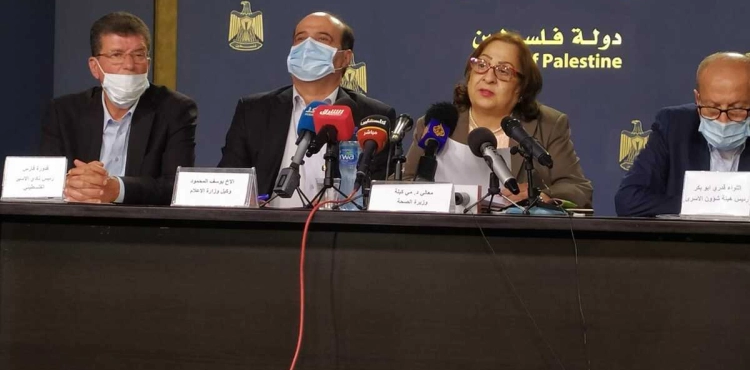The Ministry of Health , the Commission for Detainees and Ex-Prisoners Affairs and the Palestinian Prisoners Club called on international institutions to pressure the Israeli occupation authorities to allow the admission of doctors, whether Palestinian or others, to prisons, to examine the prisoners and provide them with treatment.
Health Minister Dr. Mai Kaileh told "Al-Quds".com, on the sidelines of a press conference held at the Ministry of Information headquarters in Ramallah today, "There are 500 male and female prisoners who have various diseases, including bad cases and chronic diseases, and there must be international pressure on the authorities. Occupation to treat them or allow specialized doctors, whether Palestinian or from other countries, to examine sick prisoners or enter treatment for them.
Kaileh confirmed that the occupation authorities are pursuing a policy of medical neglect against the prisoners, which must be subject to international accountability because it is in violation of international laws, as there are daily human rights violations against the prisoners, and "we really demand that there be international pressure for female prisoners and prisoners, especially the sick." .
Kaileh indicated that the Ministry of Health, through its contacts two years ago, contacted the World Health Organization and the International Red Cross, to carry out their duties towards sick prisoners, and to allow their treatment, but Israel refuses this, while Kaileh noted that work is underway to hold a special conference to activate the prisoners´ issue. patients during the next period.
During the press conference, Kaileh said: "The occupation authorities are still violating the rights of male and female prisoners in prisons, especially sick prisoners, as well as the striking prisoners ," referring to the strike of the two prisoners, Raed Rayan and Muhammad Nawara, and their suffering as a result of the strike.
Kaileh noted that there are 500 male and female prisoners who have 70 incurable diseases, including 23 with cancer, 11 with kidney diseases, 8 crippled prisoners, and 38 with physical, psychological and visual disabilities.
Kaileh touched on the suffering of the prisoner with cancer, Nasser Abu Hamid, as he faces difficult conditions and needs great care, as well as the prisoner Esraa Al-Jaabis, who needs 8 operations and continuous care, as well as the suffering of the sheikh of prisoners Fouad Al-Shobaki, and the sick prisoners: (Mansour Muqada, Khaled Al-Shawish). , Muhammad Abrash, Muwaffaq Uruq, and Nahed al-Aqra), in addition to the suffering of hundreds of sick prisoners as a result of medical negligence, which is a crime punishable by international law.
Kaileh demanded that doctors be allowed to medically examine the prisoners and treat them and provide them with the necessary medicines, and release sick prisoners to receive treatment in specialized hospitals, holding the occupation responsible for their lives and the continuation of the series of medical neglect against them, as well as for international institutions to take their role and assume their responsibilities in accordance with the relevant agreements.
For his part, the head of the Prisoners and Ex-Prisoners Affairs Commission, Major General Qadri Abu Bakr, said in a speech during the conference, "there is more than one means that the occupation authorities take to abuse our prisoners," referring to the daily policies and practices against the prisoners and assaulting them, the imposition of the policy of solitary confinement and the reduction of kanina materials. To attempts to impose laws that would treat prisoners at their own expense, as happened with the prisoner Isra Jaabis recently.
Abu Bakr noted that the occupation authorities continue to adopt a policy of holding the bodies of prisoners after their martyrdom as a punishment that is not against them but also against their families, as the occupation authorities continue to detain eight bodies of the martyrs of the captive movement.
Abu Bakr pointed out that cancer cases for sick prisoners increased from 23 to 27 after discovering 4 new cases of different cancerous tumors.
Abu Bakr noted that the occupation authorities are detaining 170 children in their prisons, as well as continuing to impose a policy of home confinement on Jerusalemite children, including children under the age of 12 and perhaps 10 years.
In his turn, the head of the Palestinian Prisoners Club, Qadura Fares, said in his speech during the conference, "The crime of deliberate medical negligence against the prisoners is a slow, premeditated murder in which all the organs of the occupying state are involved."
Fares pointed out that many of the diseases that prisoners contracted could have been controlled, but as a result of medical negligence and procrastination, they became serious and chronic diseases, noting that this also comes in the context of a series of legislation and laws aimed at making the treatment of the prisoner at his personal expense, as well as neglect to provide a budget Managing prisons without considering the importance of the prisoner’s illness, in addition to the racist treatment of sick prisoners, while Fares directed the World Health Organization to intervene to save sick prisoners.












